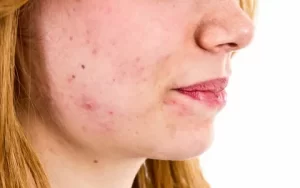Have you ever heard of fungal acne? If not, you’re not alone. This relatively new term is only recently being added to our skincare vocabulary. Skin acne is a type of skin infection caused by a fungus, which can often be confused with traditional acne. Skin acne can be tricky to treat because it doesn’t respond to traditional acne treatments like benzoyl peroxide or salicylic acid. But don’t worry; there are still plenty of options for treating and preventing skin acne. In this blog post, we will explore the top 8 lessons about acne that you should learn before you hit 30. From understanding what causes it to find the best treatments, this post will give you everything you need to know about fungal acne.
What is fungal acne?
Fungal acne is a type of skin condition caused by an overgrowth of yeast on the skin. The symptoms of skin acne include red, itchy, and scaly skin. Skin acne is typically mistaken for other skin conditions, such as eczema or psoriasis. Treatment for skin acne typically includes the use of antifungal medications.
The difference between fungal acne and regular acne
There are many differences between fungal acne and regular acne. Skin acne is caused by an overgrowth of yeast on the skin, while regular acne is caused by a build-up of oil and dead skin cells. Skin acne often appears as small, red bumps on the skin, while regular acne can appear as blackheads, whiteheads, or pimples. Skin acne is more likely on the face, back, chest, and shoulders, while regular acne is more likely on the face, neck, chest, back, and shoulders. Skin acne is not painful like regular acne can be.

The causes of fungal acne
Fungal acne is caused by an overgrowth of a type of yeast that lives on the skin. This yeast, called Malassezia, can cause an inflammatory reaction when it grows too much. The overgrowth may be due to a change in the skin’s pH, increased sebum production, or a weakened immune system. Skin acne usually appears as small, red bumps on the face, chest, or back. The bumps may be itchy or painful and flake or crust over.
The symptoms of fungal acne
There are a few key symptoms to be on the lookout for when it comes to skin acne. First and foremost, you’ll frequently notice clusters of small, red bumps on the skin. These bumps are often tender to the touch and may even be itchy.
In some cases, the bumps can even become filled with pus or fluid, which can lead to them bursting and causing even more irritation. Another common symptom of skin acne is flaking or scaling skin and dryness. You might also notice that your skin looks unusually oily, even if you don’t typically have oily skin.
If you’re experiencing any of these symptoms, you must see a dermatologist or other medical professional, so they can properly diagnose and treat your condition.
How to treat fungal acne
If you think you may have skin acne, you must see a dermatologist or other skin care professional for diagnosis and treatment. In the meantime, there are a few things you can do to help treat your skin:
1. Keep your skin clean. Wash twice a day with a mild cleanser and lukewarm water. Avoid scrubbing or harsh cleansers, which can irritate your skin and worsen the problem.
2. Apply a topical antifungal cream or ointment. These are available over the counter at most pharmacies. Be sure to follow the directions on the package carefully.
3. Don’t pick or squeeze your pimples. This can spread the fungus to other areas of your skin or cause an infection.
4. Wear loose-fitting, breathable clothing. Clothes that trap heat and moisture can make fungal acne worse.
How to prevent fungal acne
Fungal acne can be a challenge to treat and prevent. Here are some tips to help you keep your skin clear and free of this type of acne:
1. Use a gentle cleanser. Avoid using harsh soaps or cleansers that can strip the natural oils from your skin. This can lead to dryness, which can make fungal acne worse. Choose a mild, fragrance-free cleanser that will not irritate your skin.
2. Exfoliate regularly. Dead skin cells can build up on the surface of your skin and clog pores, leading to breakouts. Regular exfoliation helps to remove these dead cells and keep pores clear. Look for an exfoliating product that contains gentle ingredients like jojoba beads or lactic acid.
3. Keep your skin hydrated. Dry skin is more susceptible to fungal overgrowth and infection. Be sure to drink plenty of water throughout the day and use a light, non-comedogenic moisturizer to keep your skin hydrated.
4. Avoid touching your face unnecessarily. Your hands are full of bacteria that can quickly transfer to your face and cause breakouts. If you must touch your face, wash your hands thoroughly first!
5. Don’t share makeup or skincare products with others. Bacteria and fungi can easily be transferred from one person to another through shared products. If you must share, be sure to cleanse the products:

Fungal acne myths
One of the most common myths about fungal acne is that it is caused by poor hygiene. This is not true! Skin acne is caused by an overgrowth of a fungus called Malassezia, which is found on the skin of everyone. Overgrowth can be triggered by many things, including hormones, medications, diet, and even climate.
Another myth about skin acne is that it is easy to treat. While treatments are available, they can be expensive and may not be covered by insurance. Additionally, some people may experience recurrences even after successful treatment.
Finally, some people believe that skin acne is contagious. This is also not true! The fungus that causes skin acne cannot be spread from person to person.
Conclusion
Fungal acne is a severe and natural skin condition that can impact people of all ages. However, it is especially prevalent in adults over the age of 30. If you are struggling with skin acne, there are some important lessons you can learn to help you manage the condition and keep your skin healthy and blemish-free. This article has helped educate you about skin acne and given you some valuable tips on dealing with it.








